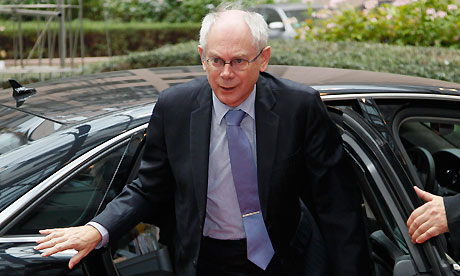 The European commission could be empowered to impose austerity measures on eurozone countries that are being bailed out, usurping the functions of government in countries such as Greece, Ireland, or Portugal.
The European commission could be empowered to impose austerity measures on eurozone countries that are being bailed out, usurping the functions of government in countries such as Greece, Ireland, or Portugal.Bailed-out countries could also be stripped of their voting rights in the European Union, under radical proposals that have been circulating at the highest level in Brussels before this week's crucial EU summit on the sovereign debt crisis.
A confidential paper for EU leaders by the EU council president, Herman Van Rompuy, who will chair the summit on Thursday and Friday, said eurobonds or the pooling of eurozone debt would be a powerful tool in resolving the crisis, despite fierce German resistance to the idea.
It called for "more intrusive control of national budgetary policies by the EU" and laid out various options for enforcing fiscal discipline supra-nationally.
The two-page paper, obtained by the Guardian, formed the basis for discussions on an interim report tabled by Van Rompuy, the European commission and the Eurogroup of countries that have adopted the euro, which is to be debated on Wednesday among senior officials in an attempt to build a consensus ahead of the summit.
Elements, however, have already sparked a backlash among eurozone member states and the suggestion that countries could lose their voting rights seems already to have been dropped.
The options outlined by Van Rompuy heavily emphasise the need for a new punitive regime overseen by EU institutions that would be given new powers of intervention. The proposals and policy options, if agreed, will be seen as seriously curbing the sovereignty of member states in setting budgetary, economic, and fiscal policy.
For countries deemed to be insolvent and in receipt of eurozone and International Monetary Fund bailouts but failing to meet the terms, Van Rompuy raised the prospect of drastic action, suggesting: "The granting of exceptional powers to the [European] commission (or another body) to take enforceable measures in the country concerned so as to ensure the stability of the euro area."
It added: "In case of consistent non-compliance, political sanctions such as the temporary suspension of voting rights [in EU councils]" might be imposed. Senior EU officials said this suggestion had been dropped in recent days.
As part of a German-led drive for a eurozone "fiscal union", Van Rompuy highlighted the potential for harmonising pension reforms, social security systems, labour market policy, and financial regulation: "Consideration could be given to use legislation to define minimum common features." Officials also said this idea had run into stiff resistance in recent days.
Other "possible further steps" generating a "higher degree of economic convergence" in the eurozone could include reinforcing the commission's and the Eurogroup's rights of prior scrutiny "of all major economic reform plans" and sanctions if the commission's recommendations to individual countries are ignored. Van Rompuy also raised the possibility of using the EU budget to reward sound fiscal conduct within the eurozone – and to punish recalcitrants.
On the two most important rules governing the single currency – that budget deficits do not exceed 3% of gross domestic product and that national debt ceilings stay within 60% of GDP – Van Rompuy called for "stricter rules" and "extended capacity of the EU institutions to enforce them".
Countries in breach of the euro rulebook could have to submit draft budgets "for approval" to the Eurogroup and the commission. The document said "a budget adopted not in line with the stability and growth pact [euro rulebook] could be considered in breach of EU obligations".
While most of the options listed might appeal to the German chancellor, Angela Merkel, and her campaign to entrench a new era of rigour in the eurozone, Van Rompuy broke ranks with Berlin's objection to eurobonds, though he was careful to stress that any mutualisation of eurozone debt would need to be gradual. "A staged criteria-based process could be envisaged and be a powerful incentive for fiscal discipline."
The eurozone blueprint agreed on Monday between Merkel and President Nicolas Sarkozy is focused on medium-term reforms. But Van Rompuy argued that "the current situation calls for immediate action. Beyond stabilisation tools, some structural steps for deepening the economic union can be implemented rapidly."
Origin
Source: Guardian
No comments:
Post a Comment